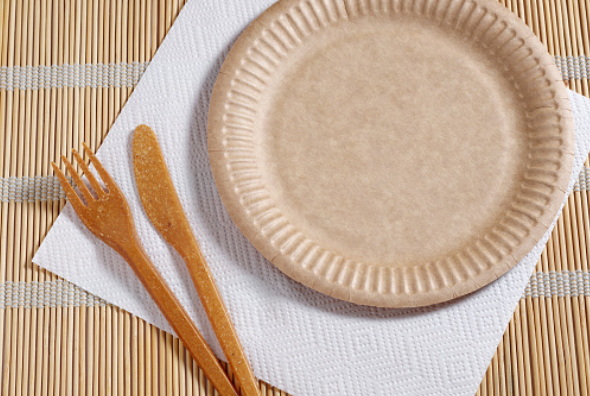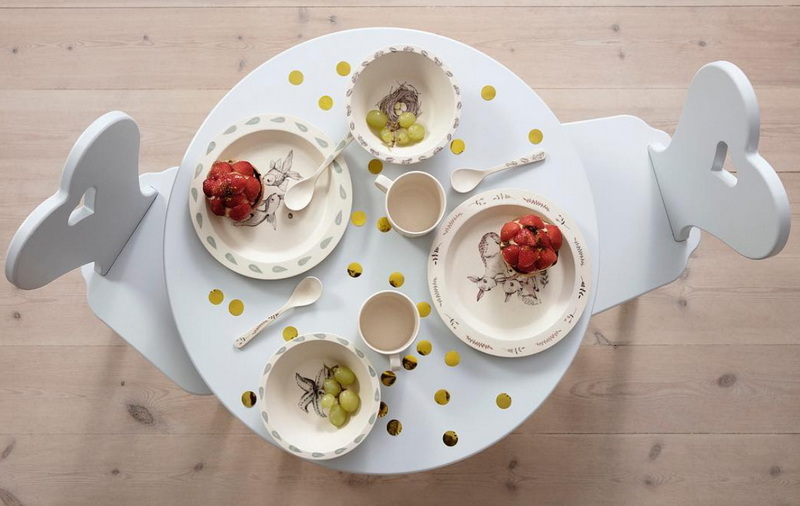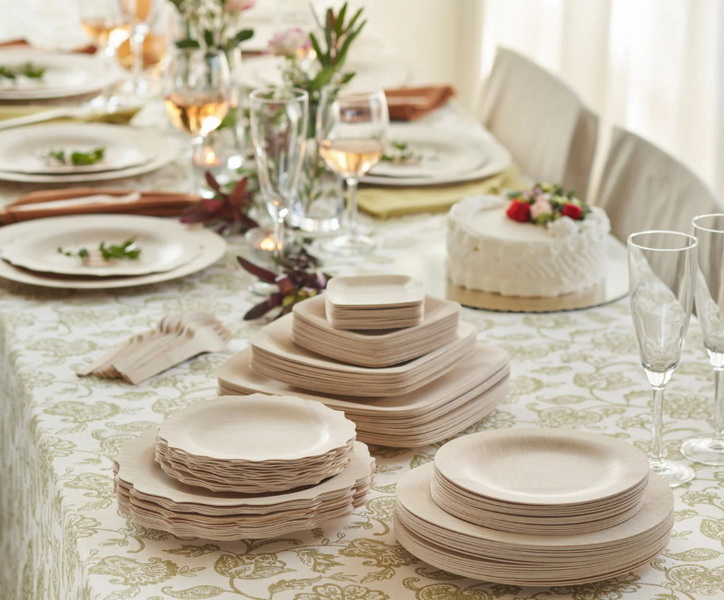
Content Menu
● The Rise of Bamboo Plates
● Rapid Growth of Bamboo
● Sustainable Harvesting
● Environmental Benefits of Bamboo Plates
● Health Benefits of Bamboo Plates
● Practical Uses of Bamboo Plates
● Comparing Bamboo Plates with Plastic Plates
● Bamboo vs. Palm Plates
● Everyday Use Cases for Bamboo Plates
● How Bamboo Plates Contribute to a Circular Economy
● Conclusion
● Frequently Asked Questions (FAQs)
>> 1. How long do bamboo plates last?
>> 2. Are bamboo plates suitable for hot food?
>> 3. Can I use bamboo plates in the microwave?
>> 4. Are bamboo disposable plates compostable?
>> 5. Where can I buy quality bamboo plates?
● Citations:
In recent years, the environmental impact of plastic has become a pressing concern, leading many consumers to seek sustainable alternatives for everyday products. Among these alternatives, bamboo plates have emerged as a popular choice. This article explores the numerous benefits of bamboo plates, particularly their eco-friendliness compared to plastic plates. We will delve into their environmental advantages, health benefits, and practical uses while also addressing common questions about bamboo tableware.

The Rise of Bamboo Plates
Bamboo plates are made from one of the fastest-growing plants on Earth, making them a renewable resource. Unlike plastic, which is derived from non-renewable fossil fuels, bamboo can grow up to 35 inches in a single day and can be harvested every few years without harming the plant. This rapid growth ensures a sustainable supply of material for manufacturing bamboo plates.
Rapid Growth of Bamboo
Bamboo is an incredibly fast-growing plant that can shoot up to 39 inches per day. Unlike traditional hardwood trees, bamboo matures in just 3-5 years, making it a highly renewable resource. This rapid growth rate allows bamboo to be harvested regularly without depleting natural resources. In fact, it can be harvested annually, which is not only sustainable but also helps maintain a healthy ecosystem.
Bamboo's ability to regenerate quickly also means it requires fewer resources compared to other wood products. This is a key factor in why it's becoming an increasingly popular material for eco-friendly tableware. The quicker the growth, the less impact it has on the environment, creating a reliable and consistent cycle of production.
Sustainable Harvesting
When bamboo is harvested, the process is remarkably sustainable. Bamboo can be cut without killing the plant, meaning it continues to grow back year after year. This regenerative process helps preserve the soil and prevents erosion. Unlike other resources that require replanting or re-growing from scratch, bamboo's natural regenerative ability makes it one of the best eco-friendly materials available.
Additionally, bamboo grows in large, dense groves, providing natural shade to the soil beneath. This shade reduces water evaporation and helps maintain soil moisture, which can be particularly important in areas with arid conditions. The planting and harvesting of bamboo support local ecosystems and help prevent land degradation.
Environmental Benefits of Bamboo Plates
Bamboo plates offer numerous environmental benefits that set them apart from other disposable tableware options.
Biodegradability
Bamboo plates break down naturally within 3-6 months when disposed of, unlike plastic plates which can take hundreds of years to decompose. This means bamboo products do not contribute to long-term pollution or environmental degradation. In addition, because bamboo is organic, there are no harmful chemicals released into the environment when it decomposes.
When bamboo plates break down, they return to the soil as compost, enriching the earth rather than polluting it. This contrasts sharply with plastic, which often ends up in landfills or oceans, causing severe environmental damage to wildlife. The process of composting bamboo plates is straightforward and requires minimal energy input, which is another factor contributing to the material's overall eco-friendliness.
Lower Carbon Footprint
Bamboo plays an important role in mitigating climate change. As it grows, bamboo absorbs carbon dioxide, helping reduce the overall carbon footprint of the plant. This makes bamboo products, including plates, more eco-friendly than many other alternatives, especially plastics that require significant energy to manufacture and contribute to harmful emissions.
The carbon sequestration potential of bamboo is one of its strongest points. In fact, studies have shown that bamboo forests absorb more carbon dioxide than most other plant species, making them a valuable tool in the fight against global warming. By choosing bamboo, you are not only reducing the use of harmful materials but also contributing to the planet's efforts to combat climate change.

Health Benefits of Bamboo Plates
Bamboo plates are not only better for the environment but also safer for human health:
- Non-Toxic: Bamboo plates are free from harmful chemicals such as BPA (Bisphenol A), phthalates, and PVC that are often found in plastic products. This makes them a safer option for serving food, especially for children.
- Antimicrobial Properties: Bamboo has natural antimicrobial properties that help prevent bacterial growth on its surface. This feature adds an extra layer of safety when using bamboo dinnerware.
- Allergy-Friendly Option: For people with allergies or sensitivities to certain materials used in traditional tableware (like certain plastics), bamboo plates provide a hypoallergenic alternative.
Practical Uses of Bamboo Plates
Bamboo plates are versatile and suitable for various occasions:
- Events and Gatherings: Their elegant appearance makes bamboo plates ideal for weddings, parties, and outdoor events. They add a touch of sophistication while being eco-friendly.
- Everyday Use: Bamboo plates can be used at home for daily meals or picnics. They are durable enough to withstand hot and cold foods without warping or breaking.
- Catering Services: Many catering businesses are adopting bamboo plates as part of their commitment to sustainability. Their strength and resistance to moisture make them perfect for serving a wide range of dishes.
- Kid-Friendly Dining: With their non-toxic nature and durability, bamboo plates are an excellent choice for children's meals at home or during outings.
Comparing Bamboo Plates with Plastic Plates
To better understand why bamboo plates are a superior choice over plastic, let's compare their key features:
| Feature | Bamboo Plates | Plastic Plates |
| Biodegradability | 100% biodegradable | Takes hundreds of years to decompose |
| Carbon Footprint | Low | High |
| Chemical Safety | Free from BPA and toxins | Often contains harmful chemicals |
| Durability | Strong and resistant | Can crack or break easily |
| Environmental Impact | Minimal | Significant pollution |
Bamboo vs. Palm Plates
Palm plates are another popular eco-friendly alternative made from fallen palm leaves. While both palm and bamboo plates are biodegradable and compostable, there are notable differences:
- Sustainability: Bamboo grows much faster than palm trees and can be harvested annually without harming the plant.
- Durability: Bamboo plates tend to be more durable than palm plates and can handle heavier foods without bending or breaking.
- Aesthetic Appeal: Bamboo has a smoother finish compared to palm leaves; this gives it an elegant look suitable for various dining occasions.
Everyday Use Cases for Bamboo Plates
Bamboo plates are not just reserved for special occasions; they can enhance everyday dining experiences:
- Family Dinners: Durable enough for everyday use while being stylish enough for guests.
- Casual Get-Togethers: Easy cleanup after gatherings with friends or family.
- Meal Prep: Convenient for storing leftovers or serving prepared meals without worrying about leaching chemicals.
How Bamboo Plates Contribute to a Circular Economy
Bamboo plates play a significant role in promoting a circular economy by minimizing waste and encouraging the reuse of materials:
- Reduction of Waste: By using bamboo plates instead of plastic ones that take centuries to decompose, we significantly reduce waste that ends up in landfills or oceans.
- Composting and Soil Enrichment: When composted properly, bamboo plates return valuable nutrients back into the soil—supporting healthy plant growth and local ecosystems.
Conclusion
Choosing bamboo plates over plastic is not just an environmentally responsible decision; it is also a healthier choice for you and your family. With their biodegradable nature, lower carbon footprint, and safety from harmful chemicals, bamboo plates provide an excellent alternative to traditional disposable tableware. As we continue to confront the challenges posed by plastic waste, embracing sustainable options like bamboo can lead us toward a cleaner and healthier planet.

Frequently Asked Questions (FAQs)
1. How long do bamboo plates last?
Bamboo plates can last several years with proper care; they are durable but should be treated gently to avoid cracking or breaking under strong impact.
2. Are bamboo plates suitable for hot food?
Yes! Bamboo plates can safely hold both hot and cold food items without warping or releasing harmful chemicals.
3. Can I use bamboo plates in the microwave?
While bamboo plates are not recommended for microwave use due to potential warping at high temperatures, they are safe for serving hot food like soups.
4. Are bamboo disposable plates compostable?
Absolutely! Bamboo disposable plates are compostable and will break down into nutrient-rich soil within months when disposed of properly.
5. Where can I buy quality bamboo plates?
Quality bamboo plates can be found at eco-friendly stores or online retailers specializing in sustainable products. Look for options that emphasize durability and non-toxic materials.
Citations:
[1] https://www.panabam.com/are-bamboo-plates-eco-friendly-environmental-benefits/
[2] https://www.anchenggy.com/blog/bamboo-disposable-plates-a-comprehensive-guide.html
[3] https://www.arbhustore.com/blogs/news/the-environmental-benefits-of-using-bamboo-plates-1
[4] https://www.arbhustore.com/blogs/news/the-benefits-of-using-bamboo-plates-in-your-kitchen
[5] https://www.sweetflavorfl.com/blog/bamboo-disposable-plates-vs-traditional-plates-which-is-better--n23
[6] https://www.homestraw.com/7-reasons-why-you-must-start-using-bamboo-fiber-plates/
[7] https://arbhuenterprises.com/why-choose-bamboo-plates-for-sustainable-dining/
[8] https://www.magicbambu.com/news/comparing-disposable-dinner-plates-and-bamboo-dinner-plates-which-one-is-better/
[9] https://www.anchenggy.com/blog/why-disposable-bamboo-plates-are-simply-the-best-choice.html
[10] https://www.restaurantware.com/blogs/catering-essentials/the-environment-benefits-when-you-use-bamboo-tableware
[11] https://ecoessentialproducts.com/blogs/eco-friendly/bamboo-vs-plastic-disposables-pros-cons
[12] https://www.researchgate.net/publication/327206790_Environmental_benefit_of_utilizing_bamboo_material_based_on_life_cycle_assessment
[13] https://www.restaurantware.com/blogs/eco-friendly-solutions/benefits-of-using-bamboo-tableware
[14] https://arbhuenterprises.com/sustainable-dining-choosing-the-best-bamboo-plates-for-eco-friendly-meals/
[15] https://www.reddit.com/r/moderatelygranolamoms/comments/1adcmxr/toddler_plates_bowls_plastic_bamboo_aka_melamine/
[16] https://www.keeo.com.au/blogs/news/bamboo-plates-a-must-for-the-environmentally-conscious
[17] https://homeplanet.grove.co/blog-posts/is-bamboo-sustainable
[18] https://www.wildandstone.com/blogs/eco-tips-and-tricks/all-you-need-to-know-about-bamboo-plates-for-babies
[19] https://ecorascals.com/blogs/blog/3-reasons-to-use-bamboo-plates
[20] https://www.bambuhome.com/blogs/bambuliving/disposable-bamboo-plates

















